The Intel Core i9-9900K at 95W: Fixing The Power for SFF
by Ian Cutress on November 29, 2018 8:00 AM ESTCPU Performance: Encoding Tests
With the rise of streaming, vlogs, and video content as a whole, encoding and transcoding tests are becoming ever more important. Not only are more home users and gamers needing to convert video files into something more manageable, for streaming or archival purposes, but the servers that manage the output also manage around data and log files with compression and decompression. Our encoding tasks are focused around these important scenarios, with input from the community for the best implementation of real-world testing.
All of our benchmark results can also be found in our benchmark engine, Bench.
Handbrake 1.1.0: Streaming and Archival Video Transcoding
A popular open source tool, Handbrake is the anything-to-anything video conversion software that a number of people use as a reference point. The danger is always on version numbers and optimization, for example the latest versions of the software can take advantage of AVX-512 and OpenCL to accelerate certain types of transcoding and algorithms. The version we use here is a pure CPU play, with common transcoding variations.
We have split Handbrake up into several tests, using a Logitech C920 1080p60 native webcam recording (essentially a streamer recording), and convert them into two types of streaming formats and one for archival. The output settings used are:
- 720p60 at 6000 kbps constant bit rate, fast setting, high profile
- 1080p60 at 3500 kbps constant bit rate, faster setting, main profile
- 1080p60 HEVC at 3500 kbps variable bit rate, fast setting, main profile
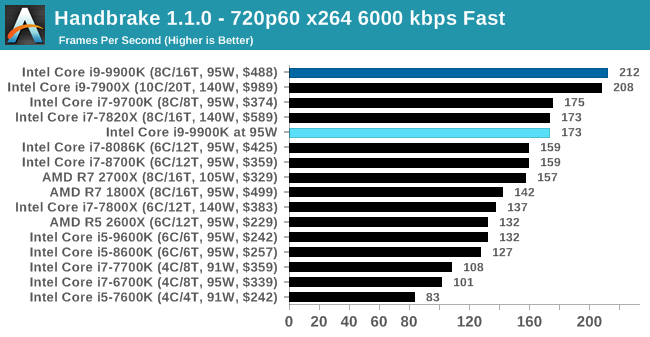
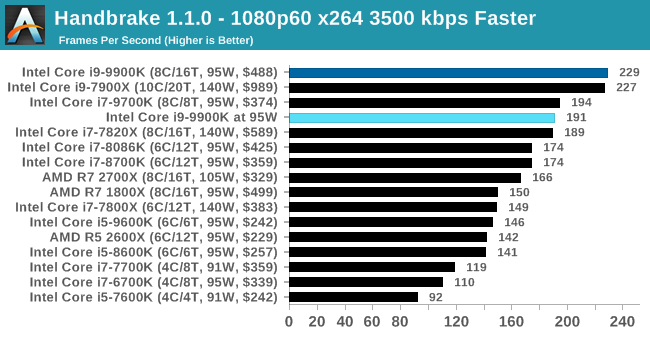
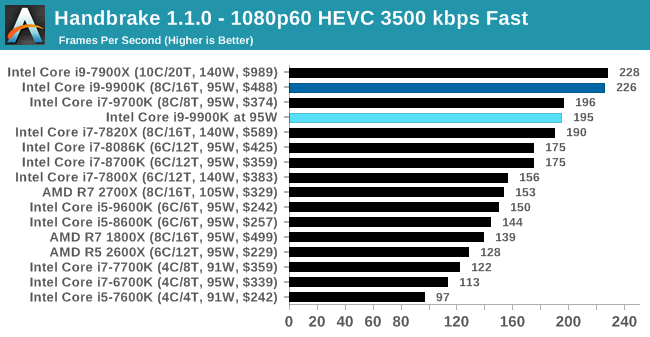
Encoding is a good example where the performance decreases by a noticable margin (10%+), although perhaps not as much as you might think. In all of our tests however, the 95W mode again pulls the 9900K down to the level of a 9700K. This pattern goes through all of our encoding tests.
7-zip v1805: Popular Open-Source Encoding Engine
Out of our compression/decompression tool tests, 7-zip is the most requested and comes with a built-in benchmark. For our test suite, we’ve pulled the latest version of the software and we run the benchmark from the command line, reporting the compression, decompression, and a combined score.
It is noted in this benchmark that the latest multi-die processors have very bi-modal performance between compression and decompression, performing well in one and badly in the other. There are also discussions around how the Windows Scheduler is implementing every thread. As we get more results, it will be interesting to see how this plays out.
Please note, if you plan to share out the Compression graph, please include the Decompression one. Otherwise you’re only presenting half a picture.
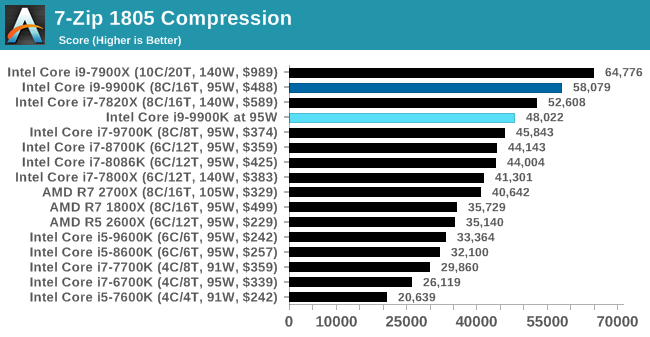
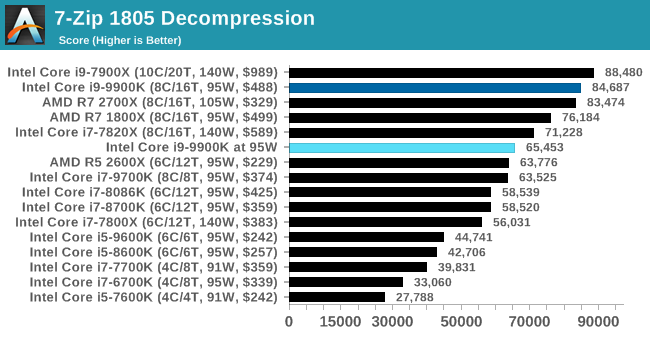
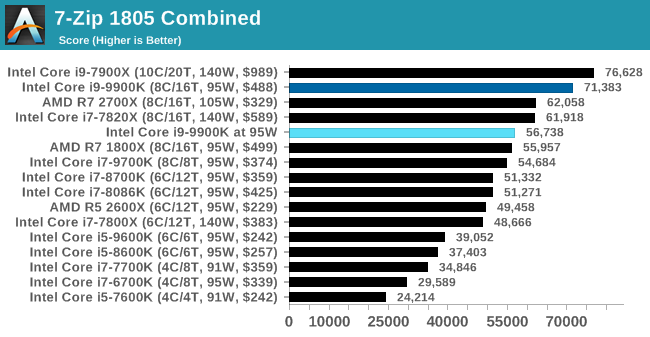
WinRAR 5.60b3: Archiving Tool
My compression tool of choice is often WinRAR, having been one of the first tools a number of my generation used over two decades ago. The interface has not changed much, although the integration with Windows right click commands is always a plus. It has no in-built test, so we run a compression over a set directory containing over thirty 60-second video files and 2000 small web-based files at a normal compression rate.
WinRAR is variable threaded but also susceptible to caching, so in our test we run it 10 times and take the average of the last five, leaving the test purely for raw CPU compute performance.
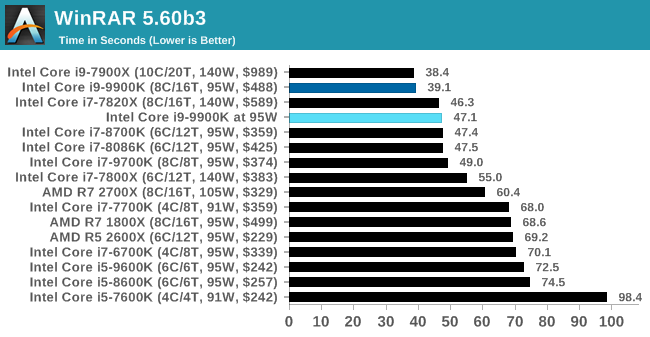
AES Encryption: File Security
A number of platforms, particularly mobile devices, are now offering encryption by default with file systems in order to protect the contents. Windows based devices have these options as well, often applied by BitLocker or third-party software. In our AES encryption test, we used the discontinued TrueCrypt for its built-in benchmark, which tests several encryption algorithms directly in memory.
The data we take for this test is the combined AES encrypt/decrypt performance, measured in gigabytes per second. The software does use AES commands for processors that offer hardware selection, however not AVX-512.
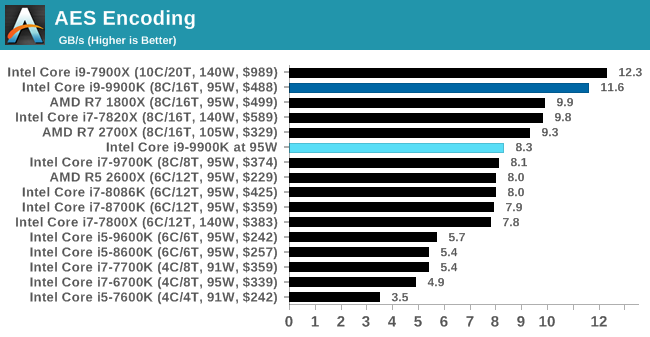










101 Comments
View All Comments
Alexvrb - Thursday, November 29, 2018 - link
Yes yes, all those office workers running a 9900K would barely notice. Serious, man? The whole reason this issue came to light was because gamers and other demanding users complained that the processor at DEFAULT settings on pretty much any retail board was annihilating TDP, even more noticeably so than their previous flagship. Journalists are lagging well behind, and when they DO bother looking into it, it's very much a "yeah it's true, shrug" article.Gastec - Wednesday, June 19, 2019 - link
Well said, "shrugging". Automagically overclocked CPU's do make benchmark graphs look better and CPUs sell better. Reminds me of one of AngryJoe's video about a certain MMO: "Oh, you want more? That would be $15 please! $15 more, please! That would be another $15!" Same with Intel, you want more performance, that would be 75% to 100% more watts, please! Yeah, I get it. Want 10 Ghz on all cores? 1000 W, what's the problem?koaschten - Thursday, November 29, 2018 - link
Check https://www.youtube.com/watch?v=kmAWqyHdebILindseyLopez - Wednesday, December 19, 2018 - link
nonicolaim - Thursday, November 29, 2018 - link
Missing link to TDP article on first page.Exodite - Thursday, November 29, 2018 - link
Thanks for this!It would be interesting, though perhaps not entirely related to this article in particular, to get a comparison on actual power draw and load temperatures as well. Similar to what you provide in your usual CPU reviews, to get a fair comparison to both the "unlocked" 9900K as well as the other slew of processors in the bench.
I'd imagine the 9900K would look much better on those numbers, though obviously worse on performance, when actually adhering to TDP.
Wingartz - Thursday, November 29, 2018 - link
*You can read it all [here], although what it boils down to is this diagram*[here] doesn't have a link to the article
:nudge> - Thursday, November 29, 2018 - link
For easy comparisons it's great to see Geekbench making an appearanceAlexvrb - Friday, November 30, 2018 - link
*worthless comparisons barely better Dhrystone and WhetstoneSirMaster - Thursday, November 29, 2018 - link
How many people are actually buying a $500 CPU and capping it's power limit to 95W?Can't be many, how about buy a different CPU if you plan on capping it's power limit like that.
I have an SFF mini-ITX build and my old overclocked haswell CPU is running at like 180W and staying cool just fine.